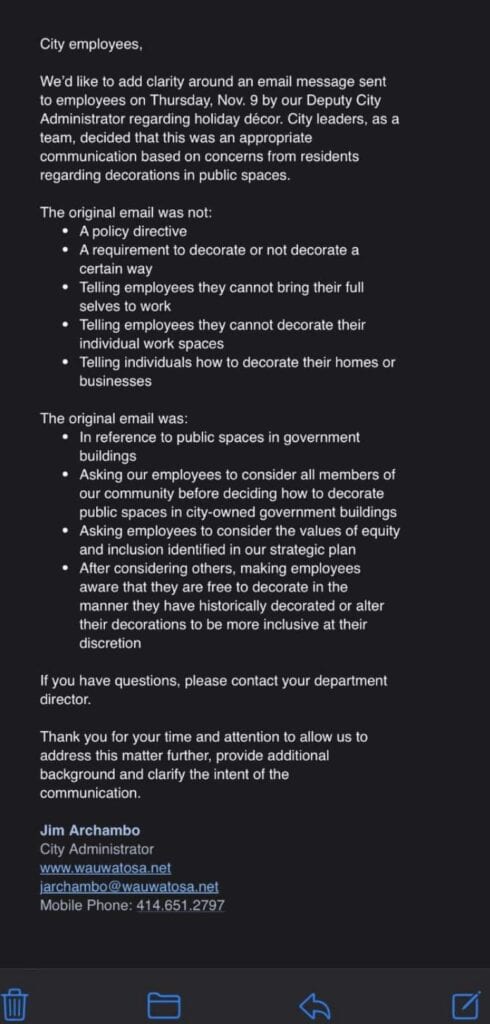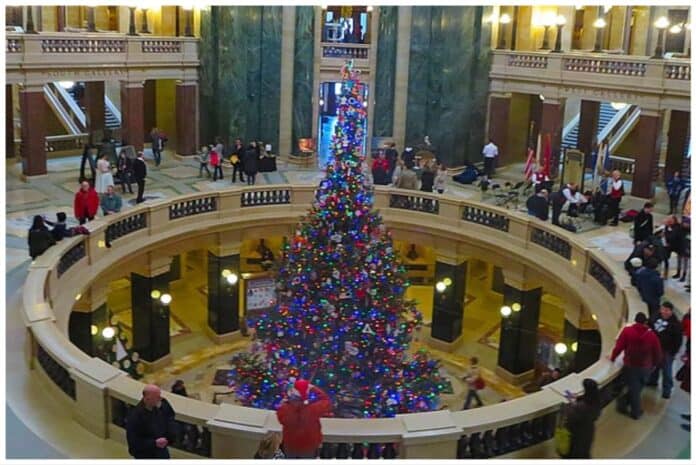The day after receiving a demand letter from a national religious freedom litigation group, and after days of national media attention and local uproar, the City of Wauwatosa has caved on Christmas, and is now telling city workers they are free to decorate how they want.
That comes after the deputy city administrator sent workers a November 9 email asking them to refrain from using Christmas decorations, including the colors red and green, and suggesting they decorate with “snow people” instead to be more “inclusive.”
City Administrator Jim Archambo sent the new email to city employees on November 13, 2023. The email says “we’d like to add clarity” around the November 9 email sent by Deputy City Administrator Melissa Weiss “regarding holiday décor.”
In the new email, Archambo said that “city leaders, as a team” had decided it was an “appropriate communication based on concerns from residents regarding decorations in public spaces.” [Note: WRN has written to Archambo and asked him how many people complained, about what, when, and to whom.]
Archambo stated in the new email that city leaders are clarifying that the original email was intended to make this point:
“After considering others, making employees aware that they are free to decorate in the manner they have historically decorated or alter their decoration to be more inclusive at their direction.”
In other words, he is now saying that employees are free to decorate how they want.
Here is the new email:

Here is the original email:

He stressed that the original email was “not a policy directive” or a “requirement to decorate or not decorate a certain way.” He said the original email was not “telling employees they cannot bring their full selves to work.”
Archambo also clarified that the original email was not telling employees they cannot decorate their individual work spaces and was not telling individuals how to decorate their homes or businesses.
He stressed it was “in reference to public spaces in government buildings” and “asking our employees to consider all members of our community before deciding how to decorate public spaces in city-owned government buildings” and was “asking employees to consider the values of equity and inclusion identified in our strategic plan.”
It turns out that Wauwatosa was not on strong legal ground with its original missive to city workers.
The City of Wauwatosa’s original email requesting city workers to refrain from using Christmas decorations or red-and-green colors in public buildings went even further than the UW System, which does allow Christmas trees, and it’s out of step with recent U.S. Supreme Court decisions, Wisconsin Right Now has learned.
Defenders of the Wauwatosa email have tended to adopt the faulty premise that government can not allow any Christmas displays or colors in city building public spaces.
However, that’s not the case law, the UW System’s own guidance indicates. The U.S. Department of Justice recently came to the same conclusion in a memorandum on the use of religious seasonal decorations in federal buildings.
Even the FREEDOM FROM RELIGION FOUNDATION admits that Christmas decorations are allowed in public buildings. “Generally, the government is allowed to celebrate the holidays with secular decorations, such as lights and depictions of Santa Claus, and in narrow circumstances, a crèche or other patently religious symbols,” the foundation writes. “The two relevant Supreme Court decisions, Lynch v. Donnelly, and Allegheny v. ACLU, were decided after a fact-sensitive analysis. Indeed the Court continually stresses that the constitutionality of such displays are determined on a case-by-case basis.”
In Lynch, the Supreme Court upheld a Rhode Island municipality’s “depiction of Santa, reindeer, a Christmas tree, Christmas carolers, cut out figurines, and candy-stripes poles, in addition to the nativity scene,” the Freedom From Religion Foundation wrote.
In the original email to city workers, Weiss wrote that she and City Administrator Jim Archambo “kindly ask that departments refrain from using religious decorations or solely associated with Christmas (such as red and green colors) when decorating public spaces within city buildings. Instead, we encourage you to opt for more neutral and inclusive decorations.” She said that “currently Christmas decorations are prevalent throughout public counters at City Hall and perhaps other buildings as well.”
In place of anything associated with Christmas, Weiss suggested decorating with “snow people,” snowflakes, or colors representing the Northern Lights, which she described as “colors like blue, green and purple” to “draw inspiration from the aurora borealis.”
She said officials’ goal was to make “everyone feel comfortable” in city building by “embracing inclusive decorating practices.”
Liberty Counsel, a national religious freedom litigation group then sent a demand letter to Wauwatosa, asking the city to retract its Christmas comments. That group called the Wauwatosa actions “unconstitutional” and contrary to recent case law. Liberty Counsel in 2022 won a major religious freedom case against the City of Boston before the U.S. Supreme Court. In that case, the city had rejected a man’s application to fly a Christian flag in a spot on public property where dozens of other flags were approved.

“The First Amendment does not permit the City to eliminate Christmas holiday symbols or expression in a misguided attempt to be “inclusive” by eliminating all traditional elements of expression regarding a federally and state recognized holiday,” Liberty Counsel noted, adding that the U.S. Supreme Court has expanded religious freedom protections in recent years by overruling the so-called “lemon test” used in the Lynch case.
“This anti-Christmas (read: anti-Christianity) purge utterly fails to consider the Supreme Court’s recent decisions in Shurtleff v. City of Boston, Massachusetts, 142 S. Ct. 1583 (2022); Kennedy v. Bremerton School District, 142 S. Ct. 2407 (2022); and Groff v. DeJoy, 600 U.S. 447 (2023). The City’s entire legal foundation (such as it was) for its Christmas decoration ban has been overruled by these cases,” Liberty Counsel wrote.
The lemon test had “called for an examination of a law’s purposes, effects, and potential for entanglement with religion,” but the 2022 Shurtleff decision “instructed that the Establishment Clause must be interpreted by ‘reference to historical practices and understanding,” Liberty Counsel wrote. In other words, religious freedom has been expanded even beyond the freedom granted in the case outlined by the Freedom From Religion Foundation.
In 2021, Henry Whitaker, legal counsel for the U.S. Department of Justice, issued a memorandum on “Religious Seasonal Decorations in Federal Government Buildings.” Whitaker found that “religious seasonal displays fall within the traditions of our country and do not, without more, contravene the Establishment Clause.”
He noted, “Avoiding systematic preference or discrimination does not mean that
seasonal decorations cannot be associated with a particular faith or school
of religious thought.”
“A display of a single decoration associated with one faith would not, for that reason alone, violate the Establishment Clause,” Whitaker added in the lengthy memorandum that relied heavily on case law. “The Establishment Clause does not require that an agency display Frank Costanza’s Festivus pole—or some other decoration associated with any particular faith or philosophy—alongside every crèche or menorah. Instead, it gives agencies significant discretion in selecting displays that are reasonably calculated to honor the broader American tradition, and to improve the morale of federal employees.”
According to the UW System, which has now been renamed to the Universities of Wisconsin, publicly funded UW campuses may put up Christmas trees. “The display of Christmas trees on campus is generally permissible. Courts have recognized that Christmas trees have become simply a secular symbol associated with the winter holiday season,” the UW guidance says.
There is nuance and compromise in the case law.
“The display of nativity scenes and menorahs has generally been upheld by courts against legal challenges if they appear as part of a larger display with a secular purpose, such as the celebration of pluralism and freedom or the promotion of tolerance and respect for diverse customs,” the UW System suggests. “…Any holiday display with an overtly religious symbol (such as a nativity scene or a menorah) should include at least one other religious symbol from a different religious tradition.”
The UW System also noted, “Displays of religious décor and symbols inside employees’ offices and cubicles are generally permissible. In fact, prohibiting the display of religious decorations and symbols may be deemed an infringement on an employee’s constitutional rights of free exercise of religion and free speech.”
A Christmas tree adorned the Wisconsin State Capitol under the administration of Republican Gov. Scott Walker. It was renamed a “holiday tree” by Democratic Gov. Tony Evers.





![Governor Caught Playing Politics with Brillion Residents’ Lives & Livelihood [COLUMN] ron tusler](https://www.wisconsinrightnow.com/wp-content/uploads/2025/07/MixCollage-15-Jul-2025-03-35-PM-9568-356x220.jpg)


![Protecting Portland: No Good Deed Goes Unpunished [REVIEW]](https://www.wisconsinrightnow.com/wp-content/uploads/2025/07/portland-356x220.jpg)























